Contract Law Case Study: Reveille Independent LLC
VerifiedAdded on 2020/05/11
|7
|1309
|31
AI Summary
This assignment delves into the legal complexities of contract formation using the case of *Reveille Independent LLC v Anotech International (UK) Ltd*. Students analyze elements such as offer, counter-offer, acceptance, the Parole Evidence Rule, and the impact of conduct on contract validity. The case study requires critical thinking and application of legal principles to evaluate the arguments presented by both parties.
Contribute Materials
Your contribution can guide someone’s learning journey. Share your
documents today.
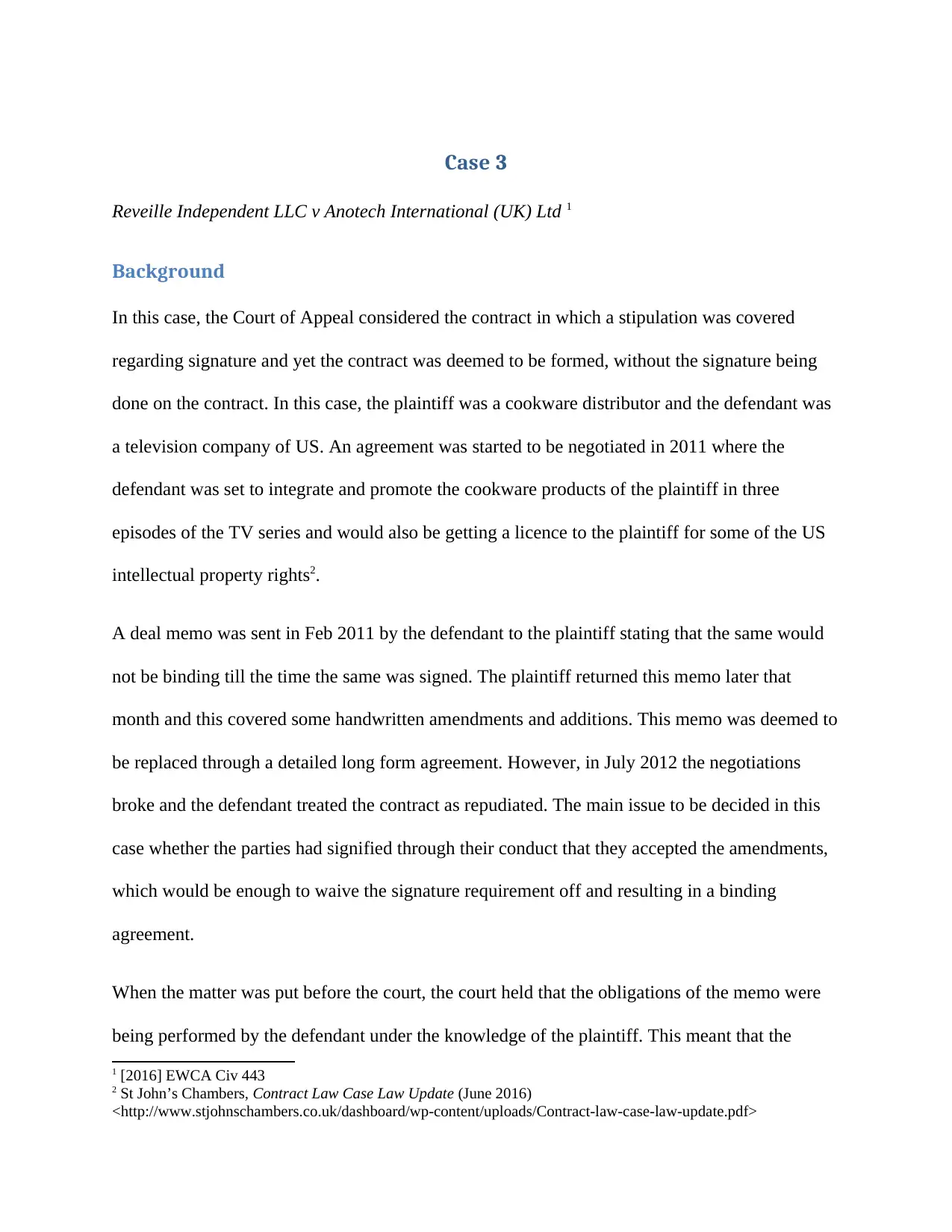
Case 3
Reveille Independent LLC v Anotech International (UK) Ltd 1
Background
In this case, the Court of Appeal considered the contract in which a stipulation was covered
regarding signature and yet the contract was deemed to be formed, without the signature being
done on the contract. In this case, the plaintiff was a cookware distributor and the defendant was
a television company of US. An agreement was started to be negotiated in 2011 where the
defendant was set to integrate and promote the cookware products of the plaintiff in three
episodes of the TV series and would also be getting a licence to the plaintiff for some of the US
intellectual property rights2.
A deal memo was sent in Feb 2011 by the defendant to the plaintiff stating that the same would
not be binding till the time the same was signed. The plaintiff returned this memo later that
month and this covered some handwritten amendments and additions. This memo was deemed to
be replaced through a detailed long form agreement. However, in July 2012 the negotiations
broke and the defendant treated the contract as repudiated. The main issue to be decided in this
case whether the parties had signified through their conduct that they accepted the amendments,
which would be enough to waive the signature requirement off and resulting in a binding
agreement.
When the matter was put before the court, the court held that the obligations of the memo were
being performed by the defendant under the knowledge of the plaintiff. This meant that the
1 [2016] EWCA Civ 443
2 St John’s Chambers, Contract Law Case Law Update (June 2016)
<http://www.stjohnschambers.co.uk/dashboard/wp-content/uploads/Contract-law-case-law-update.pdf>
Reveille Independent LLC v Anotech International (UK) Ltd 1
Background
In this case, the Court of Appeal considered the contract in which a stipulation was covered
regarding signature and yet the contract was deemed to be formed, without the signature being
done on the contract. In this case, the plaintiff was a cookware distributor and the defendant was
a television company of US. An agreement was started to be negotiated in 2011 where the
defendant was set to integrate and promote the cookware products of the plaintiff in three
episodes of the TV series and would also be getting a licence to the plaintiff for some of the US
intellectual property rights2.
A deal memo was sent in Feb 2011 by the defendant to the plaintiff stating that the same would
not be binding till the time the same was signed. The plaintiff returned this memo later that
month and this covered some handwritten amendments and additions. This memo was deemed to
be replaced through a detailed long form agreement. However, in July 2012 the negotiations
broke and the defendant treated the contract as repudiated. The main issue to be decided in this
case whether the parties had signified through their conduct that they accepted the amendments,
which would be enough to waive the signature requirement off and resulting in a binding
agreement.
When the matter was put before the court, the court held that the obligations of the memo were
being performed by the defendant under the knowledge of the plaintiff. This meant that the
1 [2016] EWCA Civ 443
2 St John’s Chambers, Contract Law Case Law Update (June 2016)
<http://www.stjohnschambers.co.uk/dashboard/wp-content/uploads/Contract-law-case-law-update.pdf>
Secure Best Marks with AI Grader
Need help grading? Try our AI Grader for instant feedback on your assignments.
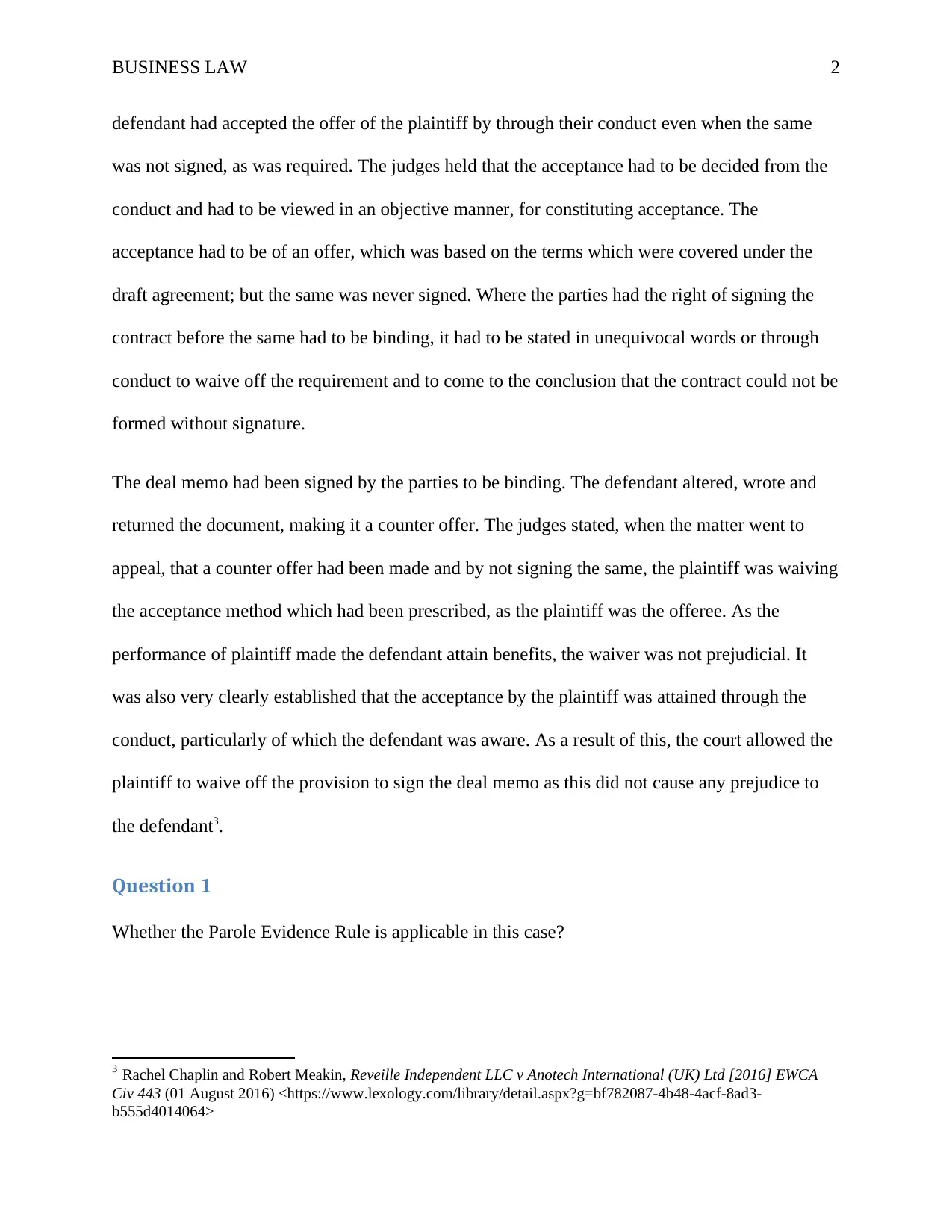
BUSINESS LAW 2
defendant had accepted the offer of the plaintiff by through their conduct even when the same
was not signed, as was required. The judges held that the acceptance had to be decided from the
conduct and had to be viewed in an objective manner, for constituting acceptance. The
acceptance had to be of an offer, which was based on the terms which were covered under the
draft agreement; but the same was never signed. Where the parties had the right of signing the
contract before the same had to be binding, it had to be stated in unequivocal words or through
conduct to waive off the requirement and to come to the conclusion that the contract could not be
formed without signature.
The deal memo had been signed by the parties to be binding. The defendant altered, wrote and
returned the document, making it a counter offer. The judges stated, when the matter went to
appeal, that a counter offer had been made and by not signing the same, the plaintiff was waiving
the acceptance method which had been prescribed, as the plaintiff was the offeree. As the
performance of plaintiff made the defendant attain benefits, the waiver was not prejudicial. It
was also very clearly established that the acceptance by the plaintiff was attained through the
conduct, particularly of which the defendant was aware. As a result of this, the court allowed the
plaintiff to waive off the provision to sign the deal memo as this did not cause any prejudice to
the defendant3.
Question 1
Whether the Parole Evidence Rule is applicable in this case?
3 Rachel Chaplin and Robert Meakin, Reveille Independent LLC v Anotech International (UK) Ltd [2016] EWCA
Civ 443 (01 August 2016) <https://www.lexology.com/library/detail.aspx?g=bf782087-4b48-4acf-8ad3-
b555d4014064>
defendant had accepted the offer of the plaintiff by through their conduct even when the same
was not signed, as was required. The judges held that the acceptance had to be decided from the
conduct and had to be viewed in an objective manner, for constituting acceptance. The
acceptance had to be of an offer, which was based on the terms which were covered under the
draft agreement; but the same was never signed. Where the parties had the right of signing the
contract before the same had to be binding, it had to be stated in unequivocal words or through
conduct to waive off the requirement and to come to the conclusion that the contract could not be
formed without signature.
The deal memo had been signed by the parties to be binding. The defendant altered, wrote and
returned the document, making it a counter offer. The judges stated, when the matter went to
appeal, that a counter offer had been made and by not signing the same, the plaintiff was waiving
the acceptance method which had been prescribed, as the plaintiff was the offeree. As the
performance of plaintiff made the defendant attain benefits, the waiver was not prejudicial. It
was also very clearly established that the acceptance by the plaintiff was attained through the
conduct, particularly of which the defendant was aware. As a result of this, the court allowed the
plaintiff to waive off the provision to sign the deal memo as this did not cause any prejudice to
the defendant3.
Question 1
Whether the Parole Evidence Rule is applicable in this case?
3 Rachel Chaplin and Robert Meakin, Reveille Independent LLC v Anotech International (UK) Ltd [2016] EWCA
Civ 443 (01 August 2016) <https://www.lexology.com/library/detail.aspx?g=bf782087-4b48-4acf-8ad3-
b555d4014064>
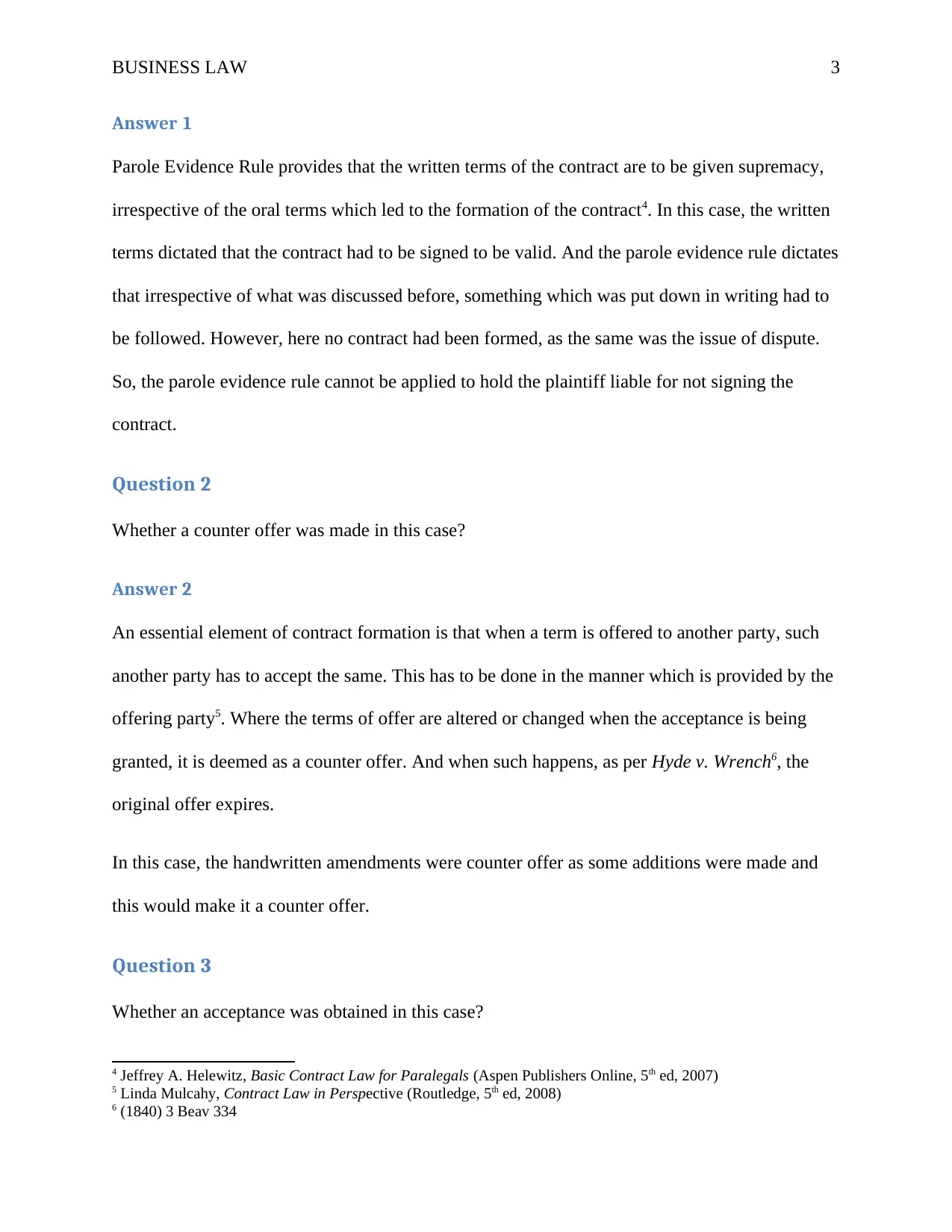
BUSINESS LAW 3
Answer 1
Parole Evidence Rule provides that the written terms of the contract are to be given supremacy,
irrespective of the oral terms which led to the formation of the contract4. In this case, the written
terms dictated that the contract had to be signed to be valid. And the parole evidence rule dictates
that irrespective of what was discussed before, something which was put down in writing had to
be followed. However, here no contract had been formed, as the same was the issue of dispute.
So, the parole evidence rule cannot be applied to hold the plaintiff liable for not signing the
contract.
Question 2
Whether a counter offer was made in this case?
Answer 2
An essential element of contract formation is that when a term is offered to another party, such
another party has to accept the same. This has to be done in the manner which is provided by the
offering party5. Where the terms of offer are altered or changed when the acceptance is being
granted, it is deemed as a counter offer. And when such happens, as per Hyde v. Wrench6, the
original offer expires.
In this case, the handwritten amendments were counter offer as some additions were made and
this would make it a counter offer.
Question 3
Whether an acceptance was obtained in this case?
4 Jeffrey A. Helewitz, Basic Contract Law for Paralegals (Aspen Publishers Online, 5th ed, 2007)
5 Linda Mulcahy, Contract Law in Perspective (Routledge, 5th ed, 2008)
6 (1840) 3 Beav 334
Answer 1
Parole Evidence Rule provides that the written terms of the contract are to be given supremacy,
irrespective of the oral terms which led to the formation of the contract4. In this case, the written
terms dictated that the contract had to be signed to be valid. And the parole evidence rule dictates
that irrespective of what was discussed before, something which was put down in writing had to
be followed. However, here no contract had been formed, as the same was the issue of dispute.
So, the parole evidence rule cannot be applied to hold the plaintiff liable for not signing the
contract.
Question 2
Whether a counter offer was made in this case?
Answer 2
An essential element of contract formation is that when a term is offered to another party, such
another party has to accept the same. This has to be done in the manner which is provided by the
offering party5. Where the terms of offer are altered or changed when the acceptance is being
granted, it is deemed as a counter offer. And when such happens, as per Hyde v. Wrench6, the
original offer expires.
In this case, the handwritten amendments were counter offer as some additions were made and
this would make it a counter offer.
Question 3
Whether an acceptance was obtained in this case?
4 Jeffrey A. Helewitz, Basic Contract Law for Paralegals (Aspen Publishers Online, 5th ed, 2007)
5 Linda Mulcahy, Contract Law in Perspective (Routledge, 5th ed, 2008)
6 (1840) 3 Beav 334
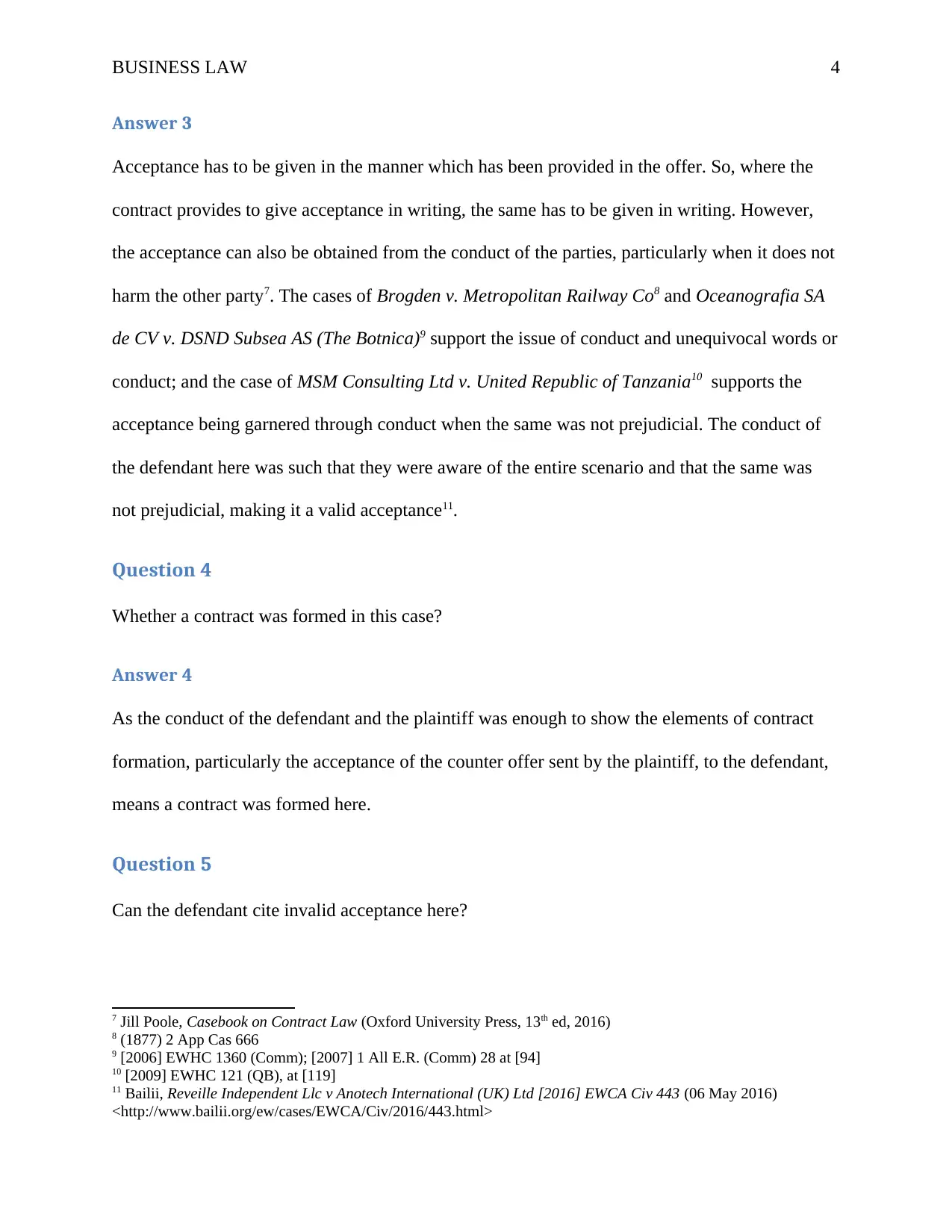
BUSINESS LAW 4
Answer 3
Acceptance has to be given in the manner which has been provided in the offer. So, where the
contract provides to give acceptance in writing, the same has to be given in writing. However,
the acceptance can also be obtained from the conduct of the parties, particularly when it does not
harm the other party7. The cases of Brogden v. Metropolitan Railway Co8 and Oceanografia SA
de CV v. DSND Subsea AS (The Botnica)9 support the issue of conduct and unequivocal words or
conduct; and the case of MSM Consulting Ltd v. United Republic of Tanzania10 supports the
acceptance being garnered through conduct when the same was not prejudicial. The conduct of
the defendant here was such that they were aware of the entire scenario and that the same was
not prejudicial, making it a valid acceptance11.
Question 4
Whether a contract was formed in this case?
Answer 4
As the conduct of the defendant and the plaintiff was enough to show the elements of contract
formation, particularly the acceptance of the counter offer sent by the plaintiff, to the defendant,
means a contract was formed here.
Question 5
Can the defendant cite invalid acceptance here?
7 Jill Poole, Casebook on Contract Law (Oxford University Press, 13th ed, 2016)
8 (1877) 2 App Cas 666
9 [2006] EWHC 1360 (Comm); [2007] 1 All E.R. (Comm) 28 at [94]
10 [2009] EWHC 121 (QB), at [119]
11 Bailii, Reveille Independent Llc v Anotech International (UK) Ltd [2016] EWCA Civ 443 (06 May 2016)
<http://www.bailii.org/ew/cases/EWCA/Civ/2016/443.html>
Answer 3
Acceptance has to be given in the manner which has been provided in the offer. So, where the
contract provides to give acceptance in writing, the same has to be given in writing. However,
the acceptance can also be obtained from the conduct of the parties, particularly when it does not
harm the other party7. The cases of Brogden v. Metropolitan Railway Co8 and Oceanografia SA
de CV v. DSND Subsea AS (The Botnica)9 support the issue of conduct and unequivocal words or
conduct; and the case of MSM Consulting Ltd v. United Republic of Tanzania10 supports the
acceptance being garnered through conduct when the same was not prejudicial. The conduct of
the defendant here was such that they were aware of the entire scenario and that the same was
not prejudicial, making it a valid acceptance11.
Question 4
Whether a contract was formed in this case?
Answer 4
As the conduct of the defendant and the plaintiff was enough to show the elements of contract
formation, particularly the acceptance of the counter offer sent by the plaintiff, to the defendant,
means a contract was formed here.
Question 5
Can the defendant cite invalid acceptance here?
7 Jill Poole, Casebook on Contract Law (Oxford University Press, 13th ed, 2016)
8 (1877) 2 App Cas 666
9 [2006] EWHC 1360 (Comm); [2007] 1 All E.R. (Comm) 28 at [94]
10 [2009] EWHC 121 (QB), at [119]
11 Bailii, Reveille Independent Llc v Anotech International (UK) Ltd [2016] EWCA Civ 443 (06 May 2016)
<http://www.bailii.org/ew/cases/EWCA/Civ/2016/443.html>
Secure Best Marks with AI Grader
Need help grading? Try our AI Grader for instant feedback on your assignments.
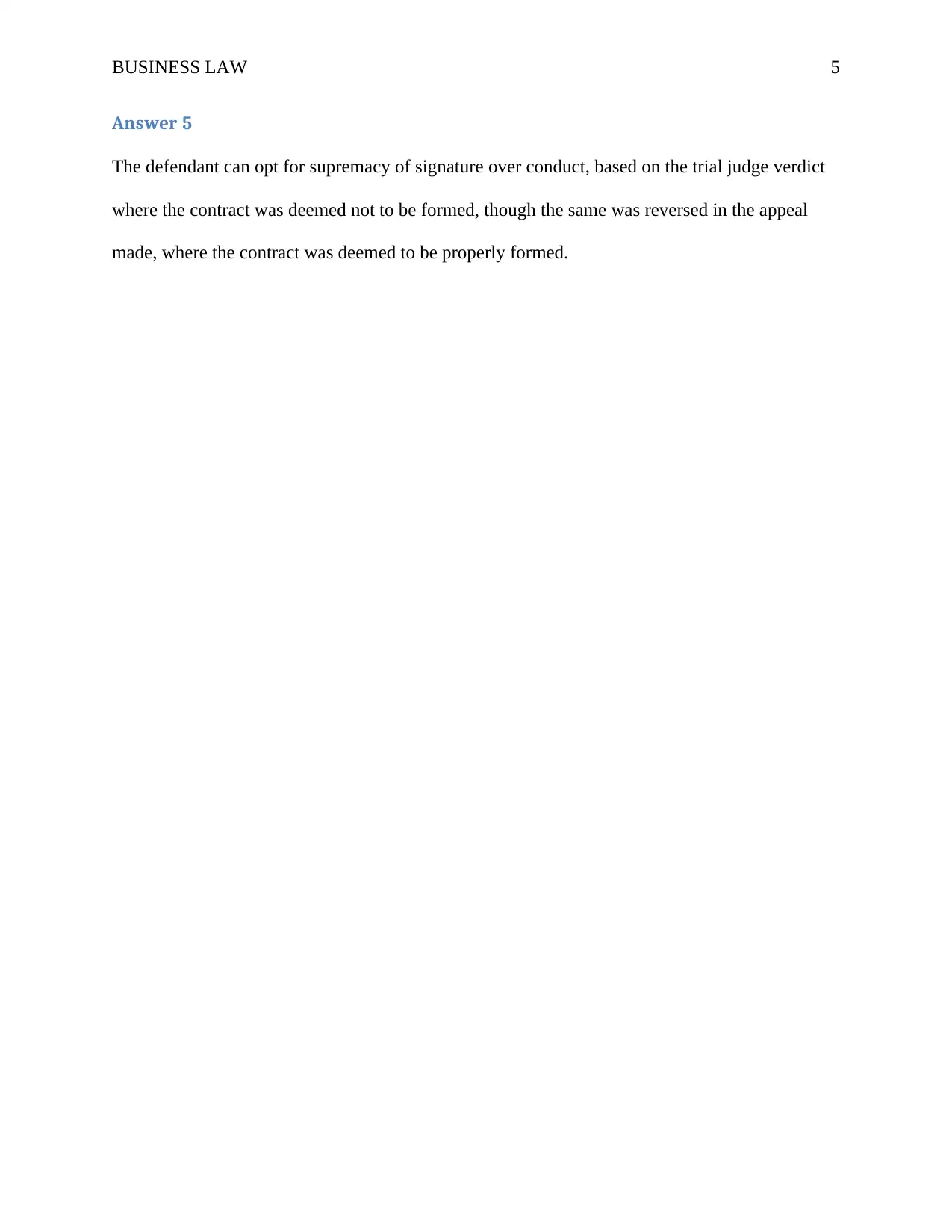
BUSINESS LAW 5
Answer 5
The defendant can opt for supremacy of signature over conduct, based on the trial judge verdict
where the contract was deemed not to be formed, though the same was reversed in the appeal
made, where the contract was deemed to be properly formed.
Answer 5
The defendant can opt for supremacy of signature over conduct, based on the trial judge verdict
where the contract was deemed not to be formed, though the same was reversed in the appeal
made, where the contract was deemed to be properly formed.
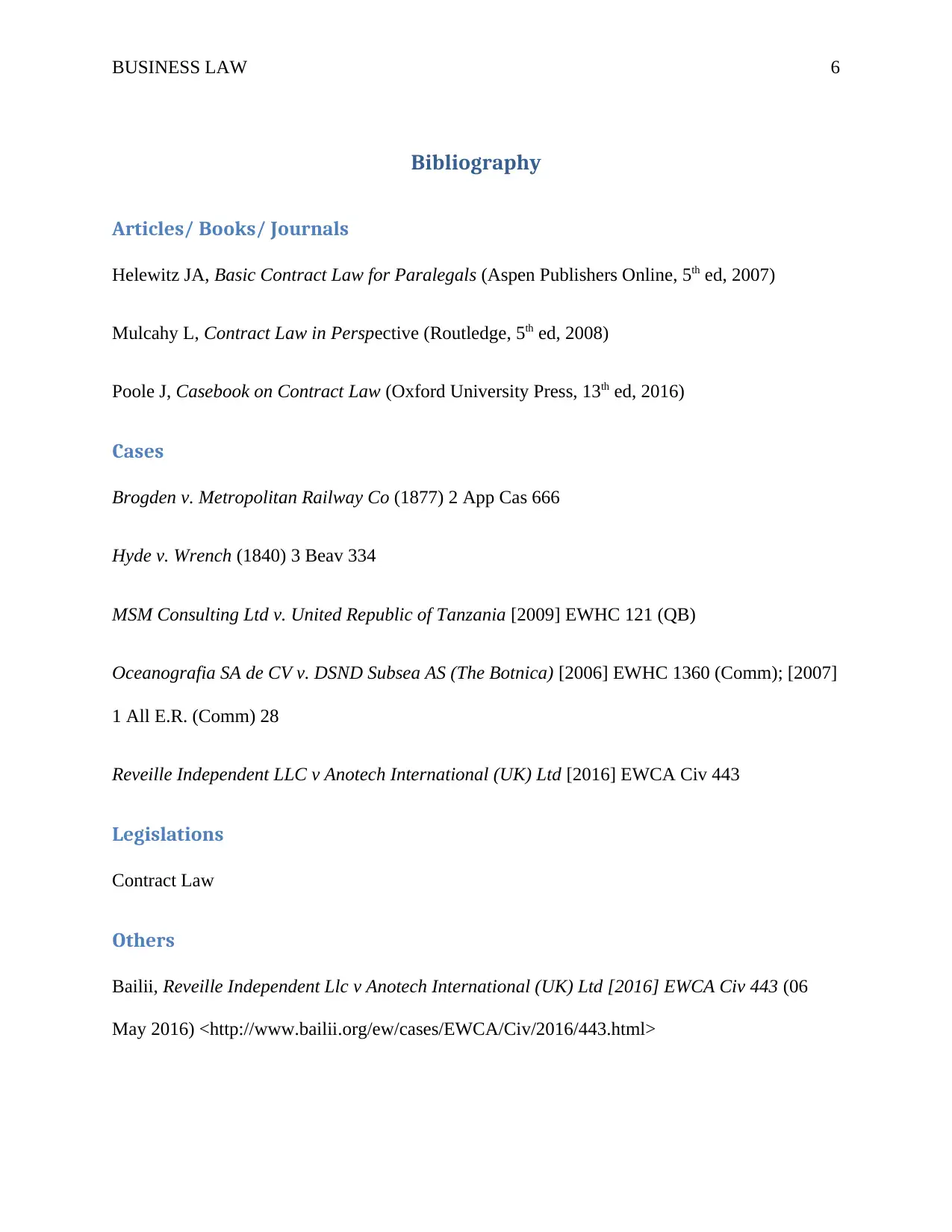
BUSINESS LAW 6
Bibliography
Articles/ Books/ Journals
Helewitz JA, Basic Contract Law for Paralegals (Aspen Publishers Online, 5th ed, 2007)
Mulcahy L, Contract Law in Perspective (Routledge, 5th ed, 2008)
Poole J, Casebook on Contract Law (Oxford University Press, 13th ed, 2016)
Cases
Brogden v. Metropolitan Railway Co (1877) 2 App Cas 666
Hyde v. Wrench (1840) 3 Beav 334
MSM Consulting Ltd v. United Republic of Tanzania [2009] EWHC 121 (QB)
Oceanografia SA de CV v. DSND Subsea AS (The Botnica) [2006] EWHC 1360 (Comm); [2007]
1 All E.R. (Comm) 28
Reveille Independent LLC v Anotech International (UK) Ltd [2016] EWCA Civ 443
Legislations
Contract Law
Others
Bailii, Reveille Independent Llc v Anotech International (UK) Ltd [2016] EWCA Civ 443 (06
May 2016) <http://www.bailii.org/ew/cases/EWCA/Civ/2016/443.html>
Bibliography
Articles/ Books/ Journals
Helewitz JA, Basic Contract Law for Paralegals (Aspen Publishers Online, 5th ed, 2007)
Mulcahy L, Contract Law in Perspective (Routledge, 5th ed, 2008)
Poole J, Casebook on Contract Law (Oxford University Press, 13th ed, 2016)
Cases
Brogden v. Metropolitan Railway Co (1877) 2 App Cas 666
Hyde v. Wrench (1840) 3 Beav 334
MSM Consulting Ltd v. United Republic of Tanzania [2009] EWHC 121 (QB)
Oceanografia SA de CV v. DSND Subsea AS (The Botnica) [2006] EWHC 1360 (Comm); [2007]
1 All E.R. (Comm) 28
Reveille Independent LLC v Anotech International (UK) Ltd [2016] EWCA Civ 443
Legislations
Contract Law
Others
Bailii, Reveille Independent Llc v Anotech International (UK) Ltd [2016] EWCA Civ 443 (06
May 2016) <http://www.bailii.org/ew/cases/EWCA/Civ/2016/443.html>
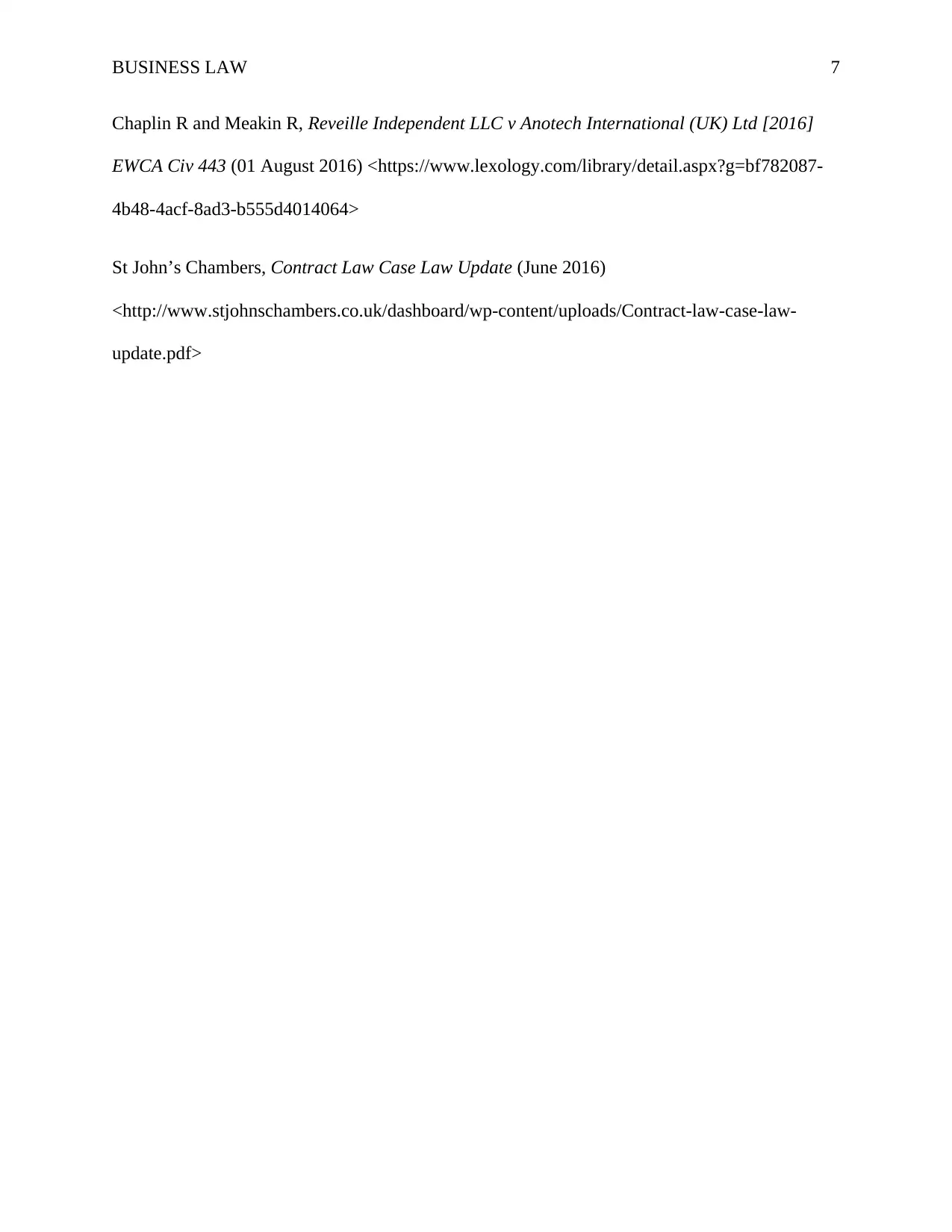
BUSINESS LAW 7
Chaplin R and Meakin R, Reveille Independent LLC v Anotech International (UK) Ltd [2016]
EWCA Civ 443 (01 August 2016) <https://www.lexology.com/library/detail.aspx?g=bf782087-
4b48-4acf-8ad3-b555d4014064>
St John’s Chambers, Contract Law Case Law Update (June 2016)
<http://www.stjohnschambers.co.uk/dashboard/wp-content/uploads/Contract-law-case-law-
update.pdf>
Chaplin R and Meakin R, Reveille Independent LLC v Anotech International (UK) Ltd [2016]
EWCA Civ 443 (01 August 2016) <https://www.lexology.com/library/detail.aspx?g=bf782087-
4b48-4acf-8ad3-b555d4014064>
St John’s Chambers, Contract Law Case Law Update (June 2016)
<http://www.stjohnschambers.co.uk/dashboard/wp-content/uploads/Contract-law-case-law-
update.pdf>
1 out of 7
Related Documents
Your All-in-One AI-Powered Toolkit for Academic Success.
+13062052269
info@desklib.com
Available 24*7 on WhatsApp / Email
![[object Object]](/_next/static/media/star-bottom.7253800d.svg)
Unlock your academic potential
© 2024 | Zucol Services PVT LTD | All rights reserved.





